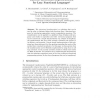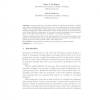161 search results - page 16 / 33 » Lazy call-by-value evaluation |
MICS
2008
13 years 7 months ago
2008
The intensional transformation is a technique that can be used in order to eliminate higher-order functions from a functional program by introducing appropriate context manipulatio...
CIKM
2006
Springer
13 years 11 months ago
2006
Springer
We present a novel approach for classifying documents that combines different pieces of evidence (e.g., textual features of documents, links, and citations) transparently, through...
IFL
1997
Springer
13 years 11 months ago
1997
Springer
Common subexpression elimination is a well-known compiler optimisation that saves time by avoiding the repetition of the same computation. In lazy functional languages, referential...
ACSC
2004
IEEE
13 years 11 months ago
2004
IEEE
This paper describes the comparison between homeless and home-based Lazy Release Consistency (LRC) protocols which are used to implement Distributed Shared Memory (DSM) in cluster...
JUCS
2007
13 years 7 months ago
2007
: Program slicing is a well known family of techniques intended to identify and isolate code fragments which depend on, or are depended upon, specific program entities. This is pa...


